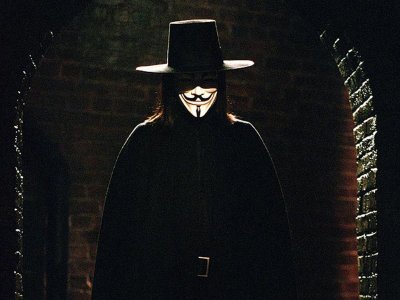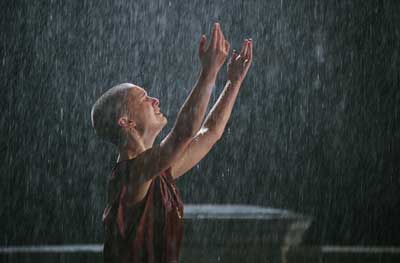V For Vendetta (2006)
DIRECTOR: James McTeigue
CAST:
Hugo Weaving, Natalie Portman, Stephen Rea, Stephen Fry, John Hurt, Tim Pigott-Smith
REVIEW:
Based on the controversial graphic novel by Alan Moore, and produced by the Wackowski brothers behind The Matrix, V For Vendetta mostly succeeds at serving up both entertaining action and a few eerily timely bits of political commentary, and represents a case of being entertained without having to leave your brain at the door.
On November 5, 1605, as many will know, a man named Guy Fawkes attempted to blow up Parliament and was hanged for his trouble. In the future, with war and a deadly biological terrorist attack (or at least that’s the official story) leading to order being restored in Britain by a Fascist totalitarian government, a man known only as V (Hugo Weaving), who hides his burned features behind a Guy Fawkes mask, seeks to unleash a wave of theatrics, rabble-rousing, bombings of London landmarks, and assassinations of prominent government officials that will culminate in the destruction of Parliament on Guy Fawkes Day. Like the man he emulates, V is either a freedom fighter or a terrorist depending on who you talk to. This is the dilemma faced by Evey Hammond (Natalie Portman), an ordinary citizen whom V saves from rape by the thuggish police after being caught on the street after curfew and then casually invites to watch as he detonates the Old Bailey building, the opening salvo of his one-man fight. The dictatorship, headed by the rarely-seen High Chancellor Sutler (John Hurt), tries to maintain a facade of control by explaining the building as a planned demolition, but V theatrically takes over a major news network to set the record straight. Over the next year, V moves like a wraith through London, simultaneously setting his government overthrow in motion and carrying out a personal vendetta against the government officials involved in his past sufferings. Evey tags along, not entirely willingly at first, then having to decide whether to escape V or support him. Meanwhile, Inspector Finch (Stephen Rea) is leading the investigation to stop V, but in the process stumbles across buried atrocities that make him question whether the real villain might be his own government.
 V for Vendetta is a rousing and thought-provoking experience even when it threatens to lapse into overwrought chaos. Like The Matrix, it’s bursting with ideas beneath its stylized action surface. It contains any number of moments to get the pulse quickening and the nape hairs standing, and asks tough questions about how far we should go in the name of security, and what defines a terrorist. The filmmakers also don’t let the stylized look and feel overwhelm the human element. In fact, the most indelible part of the movie is a lengthy subplot in which Evey reads the letter of a lesbian prisoner tortured and murdered by the government, that is so striking because its inclusion is so unexpected. And it’s hard not to see shades of Phantom of the Opera in the relationship between V and Evey. Like The Phantom, V hides disfigurements behind a mask and threatens to let personal vengeance overwhelm his claims of righteousness.
V for Vendetta is a rousing and thought-provoking experience even when it threatens to lapse into overwrought chaos. Like The Matrix, it’s bursting with ideas beneath its stylized action surface. It contains any number of moments to get the pulse quickening and the nape hairs standing, and asks tough questions about how far we should go in the name of security, and what defines a terrorist. The filmmakers also don’t let the stylized look and feel overwhelm the human element. In fact, the most indelible part of the movie is a lengthy subplot in which Evey reads the letter of a lesbian prisoner tortured and murdered by the government, that is so striking because its inclusion is so unexpected. And it’s hard not to see shades of Phantom of the Opera in the relationship between V and Evey. Like The Phantom, V hides disfigurements behind a mask and threatens to let personal vengeance overwhelm his claims of righteousness.
It’s telling of Hugo Weaving’s acting ability that he manages to generate such a strong, charismatic screen presence without once showing his face (his mask is unmoving, meaning he has no way of conveying even a hint of emotion with anything other than his voice and body language). Weaving uses his meticulously precise enunciation and commanding vocal tones to great effect- he delivers a rapid-fire monologue in which every word starts with v that has to be heard to be believe- and also gets to engage in a little Errol Flynn-style swashbuckling (although the fact that V’s features are hidden makes it impossible to determine when it is Weaving and his fight double). Natalie Portman is adequate, and at various times more than adequate, but her performance is a little uneven, and her somewhat forced English accent is somewhat distracting. Portman is particularly good during the infamous torture scene where her head is shaved, but also a few too many moments where she doesn’t seem to quite have quite a firm handle on her character. More solid is Stephen Rea, who uses his usual hangdog demeanor to good effect as Inspector Finch. In fact, despite his low-key performance, Rea’s Finch could be said to be the most three-dimensional and sympathetic character in the movie- a man with a job to do who finds nothing about his job is turning out as simple as he expects. In smaller roles, Stephen Fry is a talk show host who uses his program to slip in dissent against the government and befriends Evey, and John Hurt spends 99% of his limited screentime with his ever-angry visage amusingly projected onto a wall-sized television monitor faced by a half-circle of dwarfed underlings like some embodiment of Big Brother while he snarls and thunders about V’s antics. As his secret police chief henchman, and arguably the real primary villain, Tim Pigott-Smith is suitably oily.
 The climax is easily the weakest thing about V for Vendetta. In particular, our final brief face-to-face with Chancellor Sutler is disappointingly anti-climactic. One wonders if the filmmakers were making a statement about some dictators being figureheads to the real power behind the throne, or one’s public image not matching up with the real person, but in any case, Sutler turning out to be so pathetic kills the momentum provided by a centralized hub of villainy to battle against, and once he’s quickly here and gone, all we have left is a shootout enlivened with some (arguably too many) moves obviously inspired by The Matrix, and the destruction of Parliament, which seems a little pointless. I understand a large part of V’s mission is symbolic, creating grand spectacles to snap the public out of their apathy, but since the dictatorship has been effectively destroyed by this point, it seems the gratuitous annihilation of a historic British building. Then again, maybe we’re not supposed to be sympathizing with V by this point. In any case, the climax is disappointingly flat, even with the cool fight scenes and massive explosions, considering the build the narrative had generated leading up to it. The dictatorship goes out with a disappointing and rather anti-climactic whimper, even if V and Evey send it off with a closing bang.
The climax is easily the weakest thing about V for Vendetta. In particular, our final brief face-to-face with Chancellor Sutler is disappointingly anti-climactic. One wonders if the filmmakers were making a statement about some dictators being figureheads to the real power behind the throne, or one’s public image not matching up with the real person, but in any case, Sutler turning out to be so pathetic kills the momentum provided by a centralized hub of villainy to battle against, and once he’s quickly here and gone, all we have left is a shootout enlivened with some (arguably too many) moves obviously inspired by The Matrix, and the destruction of Parliament, which seems a little pointless. I understand a large part of V’s mission is symbolic, creating grand spectacles to snap the public out of their apathy, but since the dictatorship has been effectively destroyed by this point, it seems the gratuitous annihilation of a historic British building. Then again, maybe we’re not supposed to be sympathizing with V by this point. In any case, the climax is disappointingly flat, even with the cool fight scenes and massive explosions, considering the build the narrative had generated leading up to it. The dictatorship goes out with a disappointing and rather anti-climactic whimper, even if V and Evey send it off with a closing bang.
Even so, V for Vendetta is frequently thrilling, frequently thought-provoking, possessed of both a mind and a heart, and serves up a far richer experience than your average action thriller.
***